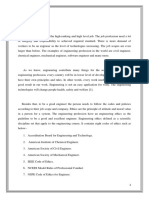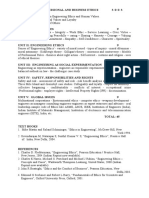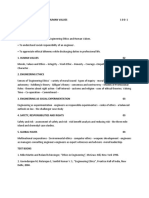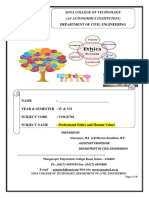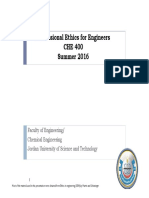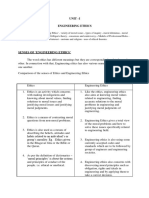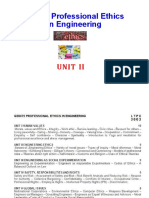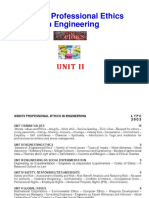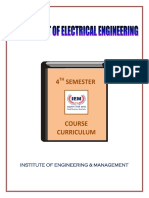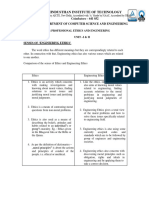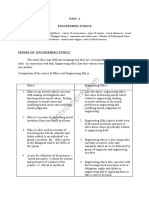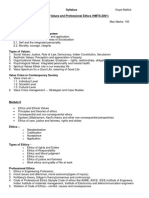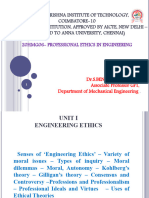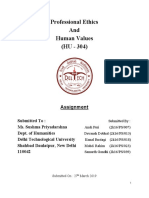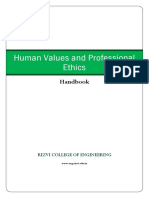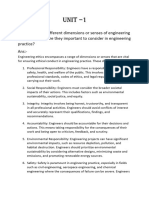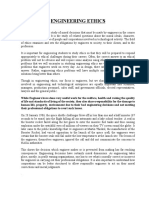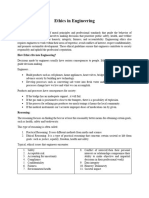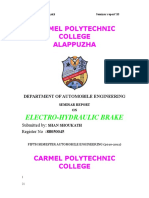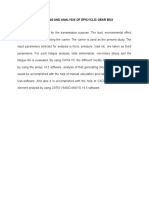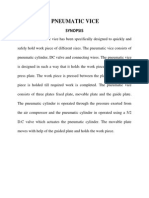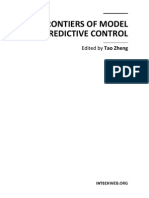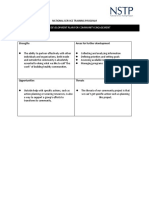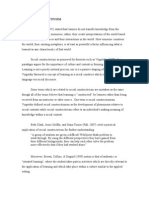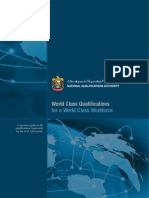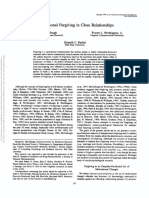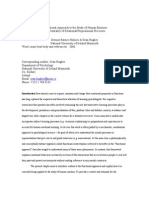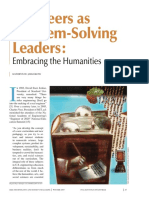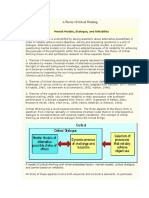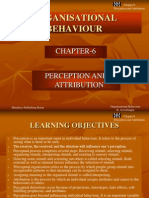Ethics For Engineers - Syllabus - 25.10.2016
Ethics For Engineers - Syllabus - 25.10.2016
Uploaded by
Vijay GanapathyCopyright:
Available Formats
Ethics For Engineers - Syllabus - 25.10.2016
Ethics For Engineers - Syllabus - 25.10.2016
Uploaded by
Vijay GanapathyOriginal Description:
Original Title
Copyright
Available Formats
Share this document
Did you find this document useful?
Is this content inappropriate?
Copyright:
Available Formats
Ethics For Engineers - Syllabus - 25.10.2016
Ethics For Engineers - Syllabus - 25.10.2016
Uploaded by
Vijay GanapathyCopyright:
Available Formats
UC007 ETHICS FOR ENGINEERS 2 0 0 2
Prerequisite -
Course 1. To foster a greater awareness of the ethical considerations that arises in the
Objectives engineering profession.
2. To encourage students to strive for high ethical standards.
3. To encourage a serious commitment to professionalism and socially
responsible behavior.
Course Upon the completion of this course, students will be able to:
Outcomes 1. Understand the significance of various human values in relation to professional
and engineering ethics. (6,8)
2. Recognize important moral/ethical issues common in engineering and apply
ethical problem-solving techniques to solve the ethical problems.(6)
3. Analyze the engineer’s responsibility for safety & risk and describe the various
methods of risk analysis.(6)
4. Identify and examine various rights and responsibilities of engineers. (6,7,8)
5. Apply professional codes of ethics and different philosophical approaches to
specific cases that might arise in an engineering career.(8,11,12)
Note: Numbers given in the parenthesis refer to Graduate Attributes required by NBA
UNIT I HUMAN VALUES 9
Morals, Values and Ethics – Integrity – Work Ethic – Service Learning – Civic Virtue – Respect
for Others – Living Peacefully – Caring – Sharing – Honesty – Courage –
Valuing Time – Co-operation – Commitment – Empathy – Self-Confidence – Character –
Spirituality – Introduction to Yoga and Meditation for Professional Excellence and Stress
Management.
UNIT II ENGINEERING ETHICS 9
Senses of ‘Engineering Ethics’ – Variety of moral issues – Types of inquiry – Moral dilemmas –
Moral Autonomy (Kohlberg’s & Gilligan’s theories) – Professional Ideals and Virtues – Ethical
Theories (Utilitarianism, Duty Ethics & Rights Ethics) and their uses – Ethical Problem-solving
Techniques .
UNIT III RISK AND LIABILITY IN ENGINEERING 9
Safety and Risk: Concept of safety, risks, acceptability of risk, lessons for the engineer.
Assessment of Safety and Risk: Knowledge of risk, uncertainties in design, testing for safety,
analytical testing methods for safety. Risk Benefit Analysis and Reducing Risk: Personal risk,
public risk and public acceptance, accounting publicly for benefits and risks, incentives to reduce
risk – The Government Regulator’s Approach to Risk - Chernobyl and Bhopal Case Studies.
UNIT IV RIGHTS AND RESPONSIBILITIES OF ENGINEERS 9
Professional Responsibilities: Collegiality and Loyalty – Respect for Authority – Collective
Bargaining – Confidentiality – Conflicts of Interest – Occupational Crime.
Rights of Engineers: Professional Right – Whistle-blowing - Employee Rights – Intellectual
Property Rights (IPR) – Discrimination.
UNIT V CODES OF ETHICS AND PROFESSIONAL CONDUCT 9
Codes of Conduct – Roles of Codes – Codes and Experimental Nature of Engineering –
Limitations of Codes – Codes of Ethics and Professional Conduct of Professional Bodies such as
Institution of Engineers (India), Institute of Electrical and Electronics Engineers (IEEE), American
Society of Mechanical Engineers (ASME), American Society of Civil Engineers (ASCE) and
National Society of Professional Engineers (NSPE) – Introduction to other types of Codes of
Ethics (Codes for the ethical use of computers, student code of ethics in university, and corporate
codes of ethics).
Text Books
1. Mike Martin and Roland Schinzinger, “Ethics in Engineering”, McGraw Hill, New York, 3rd
Edition, 2005.
2. Charles E Harris, Michael S Pritchard and Michael J Rabins, “Engineering Ethics – Concepts
and Cases”, Thompson Learning, 2000.
References
1. Charles D Fleddermann, “Engineering Ethics”, Prentice Hall, New Mexico, 1999.
2. John R Boatright, “Ethics and the Conduct of Business”, Pearson Education, 2003.
3. Edmund G Seebauer and Robert L Barry, “Fundamentals of Ethics for Scientists and
Engineers”, Oxford University Press, 2001.
4. P. S. Bajaj and Raj Agarwal, “Business Ethics – An Indian Perspective”, Biztantra, New Delhi,
2004.
5. David Ermann and Michele S Shauf, “Computers, Ethics and Society”, Oxford University
Press, 2003.
You might also like
- Applied Professional Ethics: A Developmental Approach for Use With Case StudiesFrom EverandApplied Professional Ethics: A Developmental Approach for Use With Case StudiesNo ratings yet
- CE LAWS, CONTRACTS AND ETHICS - Lesson 1Document9 pagesCE LAWS, CONTRACTS AND ETHICS - Lesson 1Precious CabigaoNo ratings yet
- CLB 40002-Assignment 1 SocietyDocument6 pagesCLB 40002-Assignment 1 SocietyNurul MukminahNo ratings yet
- (E3c Ec$ Sfo) EnginDocument36 pages(E3c Ec$ Sfo) Engintrick8No ratings yet
- 19 Psychiatric Performance Evaluation ToolDocument2 pages19 Psychiatric Performance Evaluation Toolclarheena100% (2)
- Chapter 1 Mentoring in ECEDocument13 pagesChapter 1 Mentoring in ECEcows_sign1653100% (1)
- Eight Characteristics of Principle Centered LeadersDocument15 pagesEight Characteristics of Principle Centered LeadersAhmed Zeen EL AbedenNo ratings yet
- GE8076 PE Syllabus 1Document1 pageGE8076 PE Syllabus 1Project 21-22No ratings yet
- MS2201 Ethics SyllabusDocument1 pageMS2201 Ethics SyllabusLewise AntonNo ratings yet
- Ge8076 Professional Ethics in Engineering LTPC 3003Document2 pagesGe8076 Professional Ethics in Engineering LTPC 3003RUBY T R100% (1)
- SyllabusDocument2 pagesSyllabusprabhavathysundaramNo ratings yet
- SYLLABUSDocument2 pagesSYLLABUS23mbat04No ratings yet
- Ge6075 Professional Ethics in EngineeringDocument2 pagesGe6075 Professional Ethics in Engineeringssa_joeNo ratings yet
- Ethics 2017 RegDocument1 pageEthics 2017 RegRameshkumar MNo ratings yet
- Professional Ethics Subjects in RiculumDocument5 pagesProfessional Ethics Subjects in Riculumvinith kumarNo ratings yet
- Professional Ethics SyllabusDocument3 pagesProfessional Ethics SyllabusGirish DeshmukhNo ratings yet
- Syllabus - GE8076 PROFESSIONAL ETHICS IN ENGINEERINGDocument2 pagesSyllabus - GE8076 PROFESSIONAL ETHICS IN ENGINEERINGDivya BNo ratings yet
- P Ethics SyllabusDocument2 pagesP Ethics SyllabusDinesh ANo ratings yet
- Ge606 Professional Ethics in EngineeringDocument1 pageGe606 Professional Ethics in EngineeringTECHSTARZNo ratings yet
- Mike W. Martin and Roland Schinzinger, "Ethics in Engineering", Tata Mcgraw Hill, New Delhi, 2003Document1 pageMike W. Martin and Roland Schinzinger, "Ethics in Engineering", Tata Mcgraw Hill, New Delhi, 2003Padmavathi RNo ratings yet
- Ge6075 Scad MSMDocument86 pagesGe6075 Scad MSMThala AjithNo ratings yet
- Professional Ethics and Human Values - GE1301Document1 pageProfessional Ethics and Human Values - GE1301s.meinathanNo ratings yet
- Ethics and ProfessionalismDocument7 pagesEthics and ProfessionalismCeazar Justine FuluganNo ratings yet
- Final Ethics QBDocument9 pagesFinal Ethics QBkloirywbdNo ratings yet
- UNIT-3 Engineering Ethics and Social ExperimentationDocument123 pagesUNIT-3 Engineering Ethics and Social Experimentationpinnamaraju kavyaNo ratings yet
- 14EC601 - PEHV - COURSE PlanDocument6 pages14EC601 - PEHV - COURSE Plansubrahmanyam metlaNo ratings yet
- QB Ethics 2020 2021Document15 pagesQB Ethics 2020 2021IsaiNo ratings yet
- Chapter 1 - IntroductionDocument32 pagesChapter 1 - IntroductionIbrahim AghaNo ratings yet
- GE6075 Professional Ethics in Engineering (Downloaded From Annauniversityedu - Blogspot.com)Document86 pagesGE6075 Professional Ethics in Engineering (Downloaded From Annauniversityedu - Blogspot.com)Sheela SajNo ratings yet
- GE6075 NotesDocument89 pagesGE6075 NotesAnand NagarajanNo ratings yet
- Lecture 3 Codes of EthicsDocument12 pagesLecture 3 Codes of EthicsEllen Kay CacatianNo ratings yet
- Professional Ethnics and Human Values Engineering EthicsDocument20 pagesProfessional Ethnics and Human Values Engineering Ethicsceloso5409No ratings yet
- Unit Ii NotesDocument20 pagesUnit Ii NotesMeenakshi PaunikarNo ratings yet
- Note PLE Total Notes Pre Post MidsemDocument163 pagesNote PLE Total Notes Pre Post MidsemanisharoysamantNo ratings yet
- Unit IIDocument93 pagesUnit IINISHAANTH N K 19IT060No ratings yet
- Unit IIDocument93 pagesUnit IIsgfgsfgNo ratings yet
- Professional Ethics (Mc500h)Document15 pagesProfessional Ethics (Mc500h)محمد سجار100% (1)
- Cis & QBDocument14 pagesCis & QBSARANYA MNo ratings yet
- 4 Sem Lesson PlanDocument45 pages4 Sem Lesson PlanRahulMondolNo ratings yet
- Unit-I & IiDocument21 pagesUnit-I & Iiperiyasamy.pnNo ratings yet
- Human Values & Professional EthicsDocument3 pagesHuman Values & Professional EthicsManu ManuNo ratings yet
- Hs 482 Professional EthicsDocument2 pagesHs 482 Professional EthicsHima Vijayan. V.PNo ratings yet
- Professional: Ethics in EngineeringDocument141 pagesProfessional: Ethics in EngineeringPriyankhaNo ratings yet
- Unit1 Professional EthicsDocument20 pagesUnit1 Professional EthicsmunirajNo ratings yet
- Final Syllabus Human Values & Professional Ethics (HMTS-200Document2 pagesFinal Syllabus Human Values & Professional Ethics (HMTS-200sarojbiswas_skb50% (2)
- PEDocument17 pagesPEyoyokb404No ratings yet
- Ethics GE6075Document10 pagesEthics GE6075Suma GanesanNo ratings yet
- Engineering EthicsDocument61 pagesEngineering EthicsDave ImpresoNo ratings yet
- Pe Unit 1Document112 pagesPe Unit 1VagamonNo ratings yet
- Ethics AssignmentDocument31 pagesEthics AssignmentSukant HariNo ratings yet
- Engineering Ethics: An Integrated Approach: Darlington S. Y. David, Melvin M. KollieDocument4 pagesEngineering Ethics: An Integrated Approach: Darlington S. Y. David, Melvin M. KollieVindhesh KumarNo ratings yet
- Think and Grow RichDocument11 pagesThink and Grow Richindian boyNo ratings yet
- Ge2021 PeeDocument122 pagesGe2021 PeeaassaanmkNo ratings yet
- Alok Raj (216301012) IPR Lab FileDocument60 pagesAlok Raj (216301012) IPR Lab File216301012No ratings yet
- Engineering EthicsDocument13 pagesEngineering EthicsHAMZA KHANNo ratings yet
- Definition of Engineering Ethics and ValuesDocument7 pagesDefinition of Engineering Ethics and Valuessydney augustNo ratings yet
- Ethics in Engineering - UpdatedDocument6 pagesEthics in Engineering - UpdatedtasnubamnawshinNo ratings yet
- Professional EthicsDocument36 pagesProfessional EthicsDEO SALVACIONNo ratings yet
- CHAPTER 6 (A)Document37 pagesCHAPTER 6 (A)nurhayatiNo ratings yet
- DJJ40132 Engineering and Society Chapter 3Document48 pagesDJJ40132 Engineering and Society Chapter 3Nurzatul Alia AzriNo ratings yet
- University QBDocument20 pagesUniversity QBmaheswarisubramaniNo ratings yet
- FS482 Responsible EngineeringDocument2 pagesFS482 Responsible EngineeringmellumathewNo ratings yet
- EMU - Manufacturing TechnologyDocument11 pagesEMU - Manufacturing TechnologyVijay GanapathyNo ratings yet
- Bank BuildingDocument47 pagesBank BuildingVijay GanapathyNo ratings yet
- Design and Fabrication of Pneumatic Braking System: SynopsisDocument1 pageDesign and Fabrication of Pneumatic Braking System: SynopsisVijay GanapathyNo ratings yet
- Cupola FurnaceDocument27 pagesCupola FurnaceVijay Ganapathy50% (2)
- Design and Fabrication of Power Generation Shock AbsorberDocument1 pageDesign and Fabrication of Power Generation Shock AbsorberVijay GanapathyNo ratings yet
- Electro HydraulicbrakeDocument16 pagesElectro HydraulicbrakeVijay GanapathyNo ratings yet
- Modelling and Analysis of Epicyclic Gear BoxDocument1 pageModelling and Analysis of Epicyclic Gear BoxVijay GanapathyNo ratings yet
- Drill JigDocument36 pagesDrill JigVijay GanapathyNo ratings yet
- Automatic Double Axis Welding MachineDocument1 pageAutomatic Double Axis Welding MachineVijay GanapathyNo ratings yet
- Pneumatic Auto Gear ChangerDocument2 pagesPneumatic Auto Gear ChangerVijay GanapathyNo ratings yet
- Pneumatic ViceDocument2 pagesPneumatic ViceVijay Ganapathy100% (1)
- Tet Final Model Exam Paper 2 Science FinalDocument14 pagesTet Final Model Exam Paper 2 Science FinalVijay GanapathyNo ratings yet
- Community Dentistry IDocument5 pagesCommunity Dentistry IrooftoptohNo ratings yet
- Overexcitabilities by Piechowski 1999Document10 pagesOverexcitabilities by Piechowski 1999jcbazinetNo ratings yet
- StellaDocument11 pagesStellaMohd FarhanNo ratings yet
- Meaning and Needs of Value EducationDocument21 pagesMeaning and Needs of Value EducationJM De Vera100% (1)
- Introduction To Process ControlDocument19 pagesIntroduction To Process ControlTamoor TariqNo ratings yet
- Lecture 11 SHRM FitDocument20 pagesLecture 11 SHRM FitEjazNo ratings yet
- Edred Thorsson - The Soul (1989)Document2 pagesEdred Thorsson - The Soul (1989)Various TingsNo ratings yet
- Movement of Personality and OtherDocument2 pagesMovement of Personality and OthercarendleonNo ratings yet
- Control TheoryDocument27 pagesControl TheorySushmita KujurNo ratings yet
- Frontiers of Model Predictive ControlDocument168 pagesFrontiers of Model Predictive ControlcemokszNo ratings yet
- ColDocument3 pagesColyeahpooNo ratings yet
- Social ConstructivismDocument2 pagesSocial Constructivismleeza dizonNo ratings yet
- UAE Qualifications FrameworkDocument8 pagesUAE Qualifications FrameworkTonyP1958No ratings yet
- Interpersonal Forgiving in Close Relationships: Michael E. Mccullough Everett L. Worthington, JRDocument16 pagesInterpersonal Forgiving in Close Relationships: Michael E. Mccullough Everett L. Worthington, JRYulia AfresilNo ratings yet
- Nothing More To Offer?Document3 pagesNothing More To Offer?Speech & Language Therapy in PracticeNo ratings yet
- B - BARNES-HOLMES, D. (2006) - A Functional Approach To The Study of Human EmotionDocument11 pagesB - BARNES-HOLMES, D. (2006) - A Functional Approach To The Study of Human EmotionRodrigo CésarNo ratings yet
- Dynamics of Group DiscussionDocument4 pagesDynamics of Group DiscussionharryamanNo ratings yet
- Journal of Baltic Science Education, Vol. 16, No. 3, 2017Document161 pagesJournal of Baltic Science Education, Vol. 16, No. 3, 2017Scientia Socialis, Ltd.No ratings yet
- Fundamentals of Organizational Behavior: Giovanni T. Macahig, DM-HRMDocument32 pagesFundamentals of Organizational Behavior: Giovanni T. Macahig, DM-HRMsam_suhaimiNo ratings yet
- Engineers As Problem-Solvers PDFDocument7 pagesEngineers As Problem-Solvers PDFscribd4tavoNo ratings yet
- A Theory of Critical ThinkingDocument2 pagesA Theory of Critical ThinkingAfriantoNo ratings yet
- Applying Learning Theories To Healthcare PracticeDocument14 pagesApplying Learning Theories To Healthcare PracticeNethera Kiza Imperial100% (2)
- Chapter 6Document18 pagesChapter 6komal424267% (3)
- Holy Family Academy: Title (Center - Bold - Font - Arial Font Size 14)Document21 pagesHoly Family Academy: Title (Center - Bold - Font - Arial Font Size 14)Ren AlbanoNo ratings yet
- Psychoanalysis Film PDFDocument7 pagesPsychoanalysis Film PDFJanardhan Juvvigunta JJNo ratings yet
- Purpose of Guidance ServicesDocument17 pagesPurpose of Guidance ServicesVina Rose Y. ManaysayNo ratings yet
- Some Differences Make A Difference Individual Dissimilarity and Group Heterogeneity As Correlates of Recruitment, Promotions, and TurnoverDocument16 pagesSome Differences Make A Difference Individual Dissimilarity and Group Heterogeneity As Correlates of Recruitment, Promotions, and TurnoverTala DearNo ratings yet


